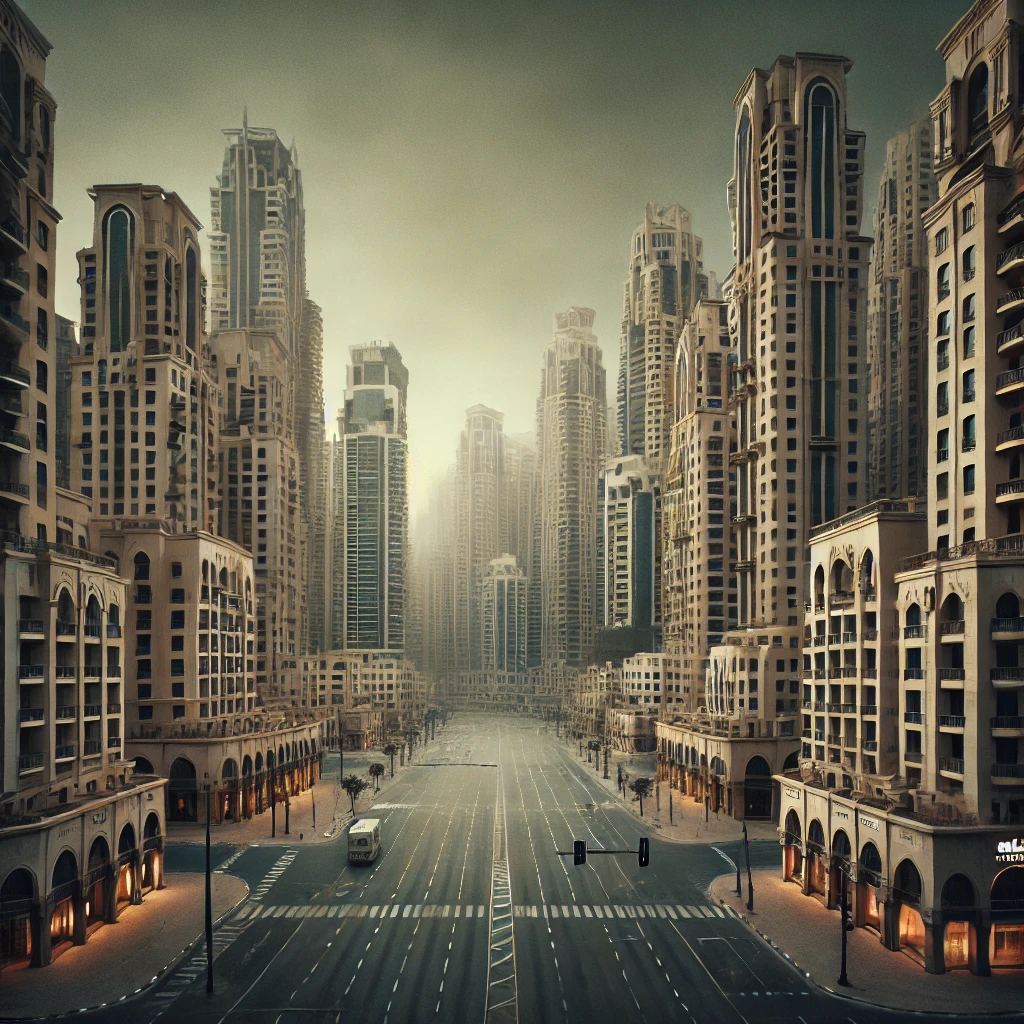The real estate market in Dubai: from boom to crisis and prospects for recovery

- How has the change in real estate in Dubai affected the emirate's economy?
- How does the crisis affect the real estate market in Dubai?
Introduction to the Real Estate Changes in Dubai
In 2002, the government of Dubai took an important step towards revitalizing the real estate market by allowing foreign citizens to purchase property under a freehold scheme in designated areas. This innovation became a powerful catalyst for the rapid development of the sector, which soon occupied a central position in the region's economic structure. Investments from around the world flooded into Dubai's real estate, marking the beginning of an incredible growth period.
Rise in real estate prices
From 2002 to 2008, the cost of residential real estate in Dubai increased almost fourfold. Significant influence on these changes was exerted by large-scale construction projects, which helped Dubai establish itself as one of the fastest-growing megacities in the world. A striking example of this progress is the artificial island The Palm Jumeirah, which attracted attention and inspired authorities to implement numerous new large-scale initiatives, including the creation of new archipelagos and the construction of the tallest building on the planet.
Investments and market activity
In the most active years of price growth, especially from 2005 to 2007, foreign investors eagerly purchased real estate during the construction phase, which contributed to further price increases. At that time, the main reason for buying was the promising prospects for resale. The most sought-after properties sold out in just a few days:
- Villas on the "branches" of The Palm Jumeirah island were disappearing from the market even before their construction was completed.
The variety of housing in Dubai
In addition to large construction projects, the city also saw the development of smaller complexes with apartments, villas, and townhouses. Against the backdrop of high-end real estate, more affordable options emerged, which were actively purchased for subsequent rental. The rapid economic growth of the emirate attracted numerous international companies in need of housing for their foreign employees. As a result, the rental market showed high growth rates, sometimes surpassing the sales segment.
Rental rates and their regulation
Average rental rates increased by about 20% annually until 2006, when Sheikh Mohammed imposed a cap on rent increases — no more than 15%. However, by 2007, changes began to occur in the market. The volume of offerings reached significant levels, and investor interest noticeably weakened. Nevertheless, speculative expectations continued to drive price growth, albeit at a more moderate pace.
The consequences of the financial crisis in 2008
By 2008, against the backdrop of the global financial crisis, the successful introduction of new projects and a reduction in speculative interest, the market reached its peak. The first half of 2009 was marked by a sharp decline in prices, comparable to the previous boom. This crisis significantly changed the dynamics of the Dubai real estate market and impacted various sectors of the emirate's economy, leaving behind many questions and challenges for future investments and development.
Decrease in housing prices in Dubai
In the past six months, there has been a sharp decline in real estate prices in Dubai, amounting to about 50%.
9 October 2024
29 January 2025
29 September 2025
9 October 2024
29 January 2025





Sale hotels in Jumeirah Lake Towers with city view 190 600 $

1

2

80

Sale office in Jumeirah Lake Towers 368 000 $

1

127
However, not everyone was able to recover their investments. Unlike the crisis situation in 2010, when there were no such sharp price declines, the current signs of crisis have started to manifest more clearly. The volume of transactions was down by 65%, despite the fact that the supply of real estate continued to grow.
Regional price characteristics
Despite the overall decline in prices in the residential real estate sector, the most sought-after areas and projects remain less affected by this trend. By 2011, the falling prices had somewhat stabilized, and the volume of offerings began to decrease slightly.
Gradually, prices began to rise, especially in prestigious locations such asThe Palm Jumeirahwhere the cost of villas has increased by 20-25%.
Different consequences for projects
Although the overall real estate market in Dubai is facing crisis phenomena, not all its parts and projects are experiencing the same degree of impact. Budget properties have been hit the hardest by the challenges, such as:
- International City
- Discovery Gardens
and also areas with underdeveloped infrastructure. At the same time, in such well-known places asThe Palm JumeirahandDubai MarinaThe price reduction turned out to be minimal.
Market conditions and consumer demand
The modern real estate market in Dubai is dominated by secondary housing, while leading construction companies are not announcing any new large projects. There is the highest demand for ready-to-move-in properties along the coast: in the areasThe Palm Jumeirah,Dubai Marina,Jumeirah Lakes TowersandThe GreensThere is a positive trend being observed.
In areas located further from the sea, the situation remains quite stable, as many projects are still unfinished and investors have not returned to these sectors.
Current deals and expectations for the future
As for real estate transactions, today most of them are aimed at personal residence, while small investors buy apartments to rent them out. According to experts, the Dubai real estate market is expected to recover in 2012 due to new mortgage programs and the launch of various projects aimed at increasing the confidence of foreign investors.
The impact of the crisis and government actions
CrisisIn the real estate sector, it has undoubtedly had a significant impact on the economic situation in Dubai. However, the emirate's government is actively working to address these issues, taking steps to restore the real estate market and increase investor confidence.
In particular, the authorities established a special committee to address the crisis, which focused on developing strategies to combat the negative effects of the financial crisis both for Dubai itself and for the entire country.

Conclusion
While writing this article about the development of the real estate market in Dubai, I realized how unique and multifaceted this process is. Since the authorities of the emirate opened the doors to foreign investments in 2002, Dubai has experienced a remarkable boom, becoming a captivating example of successful economic transformation.
This boom not only created images of incredible architectural achievements, such as artificial islands.The Palm Jumeirah...but also created a new market that attracted the attention of investors from around the world. I was amazed at how the rapid wave of real estate development led to housing prices nearly quadrupling in just a few years.
At the same time, I saw how speculation and excessive enthusiasm from investors ultimately led to a crisis.The crash of 2009became a shocking lesson for all market participants, reminding them of the importance of sustainable foundations in the economy.
The current situation in Dubai shows that the market is gradually recovering, and new projects and programs are creating hope for further growth. I have a great interest in how the emirate's authorities are working to restore investor confidence through the creation of new mortgage programs and initiatives aimed at strengthening the markets.
Key points
- Market surge:Opening the market to foreigners in 2002.
- Economic boom:The increase in real estate prices is almost fourfold.
- The crisis of 2009:Market crash and falling housing prices.
- Recovery:Gradual price increase and updates to mortgage programs.
Looking back at all the previous stages of development, I realize that every crisis and every recovery lays new foundations for the future. Thus, Dubai continues to be in the spotlight not only as a place to live but also as a vivid example of successfully overcoming economic challenges.
In conclusion, it can be stated that the Dubai real estate market, despite its fluctuations, has enormous potential for further growth and development, and I believe that even more exciting times lie ahead.
Comment
Popular Posts
9 October 2024
1497
29 September 2025
448
9 October 2024
9969
29 January 2025
1573
Popular Offers

Subscribe to the newsletter from Hatamatata.com!
Subscribe to the newsletter from Hatamatata.com!
I agree to the processing of personal data and confidentiality rules of Hatamatata





